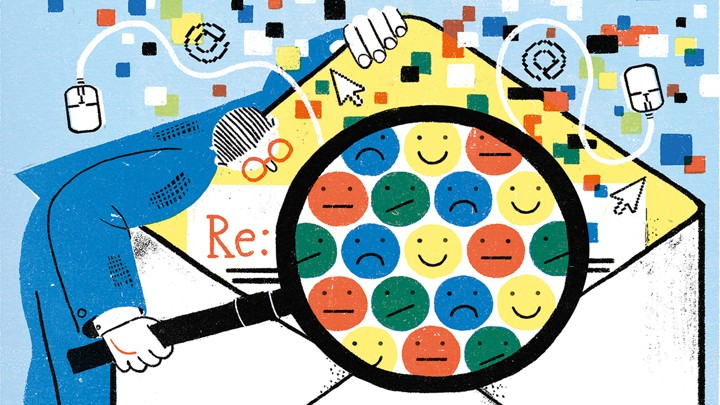trends
How should we regulate facial recognition?
Facial recognition is everywhere — airports, police stations, and built into the largest cloud platforms in the world — but there are few federal rules about how it can be used. Is it time to change that?
Source: How should we regulate facial recognition? – The Verge
No flipping: How smart TVs are getting quite smart about you
Smarter sets could mean more niche programming and fewer annoying ads, says the TV industry. Privacy advocates worry consumers are being kept in the dark.
Source: No flipping: How smart TVs are getting quite smart about you
Skim reading is the new normal. The effect on society is profound
When the reading brain skims texts, we don’t have time to grasp complexity, to understand another’s feelings or to perceive beauty. We need a new literacy for the digital age writes Maryanne Wolf, author of Reader, Come Home
The four ways that ex-internet idealists explain where it all went wrong
21st-century digital evangelists had a lot in common with early Christians and Russian revolutionaries.
Source: The four ways that ex-internet idealists explain where it all went wrong – MIT Technology Review
Pew Study: Teens Aren’t Happy With Their Screen Time
Many parents think teens are too absorbed by screens. Teens agree.
Source: Pew Study: Teens Aren’t Happy With Their Screen Time – The Atlantic
What Would It Take to Get Businesses to Focus Less on Shareholder Value?
To make world-class corporate citizenship and profitability work in tandem, we need to change the rules so that racing to the bottom is no longer the most effective way to compete, and to ensure that treating people well is the profitable thing to do. This means continuing the push to raise the minimum wage and to make the provision of decent health and educational benefits mandatory — or at the very least, heavily tax-advantaged. It means grappling with the explosion of contract work, ensuring that employers can’t evade their responsibilities by simply relabeling employees as contractors.
Source: What Would It Take to Get Businesses to Focus Less on Shareholder Value?
The 9 Best Books About the Financial Crash 2018
The Shifts and the Shocks: What We’ve Learned — and Have Still to Learn — From the Financial Crisis
Mark Zuckerberg Is Totally Out of His Depth
And so are all the big boys of tech.
Source: Mark Zuckerberg Is Totally Out of His Depth – Bloomberg
How Your Brain Tricks You Into Believing Fake News
‘It’s the equivalent of a public health crisis.’
Source: How Your Brain Tricks You Into Believing Fake News | Time
Snap’s Drop in Active Users Could Signal a Social Media Peak
The maker of Snapchat said it lost 3 million daily active users in the latest quarter, following similar drops or flattening growth from Facebook and Twitter.
Source: Snap’s Drop in Active Users Could Signal a Social Media Peak – The New York Times
AI That Reads All a Company’s Emails to Gauge Morale
Employee emails contain valuable insights into company morale—and might even serve as an early-warning system for uncovering malfeasance.
Source: AI That Reads All a Company’s Emails to Gauge Morale – The Atlantic
Gatekeepers or Censors? How Tech Manages Online Speech
The rules that Apple, Google, Facebook and Twitter follow in their roles as arbiters of online speech are often vague. Critics say they are arbitrary.
Source: Gatekeepers or Censors? How Tech Manages Online Speech – The New York Times
5 Ways Brands Can Engage Gen Z On Social Media
With buying power of over $140 billion Gen Z’ers are rightfully so an appeal for brands. Engaging with them, especially on social media, can be challenging. Here’s 5 ways to meet those challenges head on.
Lobe Is A Machine Learning Platform For Complete Idiots
From Apple, Facebook, and Nest alum Mike Matas, Lobe makes it so you don’t need to be a data scientist to build incredible AI tools.
Source: Lobe Is A Machine Learning Platform For Complete Idiots
Walmart.com Redesigns As The Anti-Amazon
The retailer wants to translate the best parts of its stores–like the friendliness of its greeters and the local preferences of its shoppers–for the web.
An Apology for the Internet — From the People Who Built It
Big Data Is A Sham
Decades of research has shown that you can get a pretty accurate picture of the US population from a sample of under 3000 people, if you choose them carefully. If you really, really want to drop your margin of error as low as possible, you look at about 9000. After that, there’s just not a lot of gains to be had. U.S. pollsters looked at the intentions of hundreds of thousands of Americans and still called the 2016 election wrong. Politicians’ careers depend on accuracy. Creative people’s careers depend on insights, and that’s where small data rules.
Source: Big Data Is A Sham
True enough. But big data companies are not trying to predict population trends. They want to microtarget individuals.
AI chips soon will power PCs, cars, security cameras and smart speakers
Processors with artificial intelligence will spread from today’s top-end phones to cars, PCs, security cameras, smart speakers and mainstream phones.
Source: AI chips soon will power PCs, cars, security cameras and smart speakers – CNET
How Technology is Hijacking Your Mind — from a Former Insider
Where does technology exploit our minds’ weaknesses?
Source: How Technology is Hijacking Your Mind — from a Former Insider
We Already Know How to Protect Ourselves From Facebook
Facebook may complain that these changes to data collection and use would destroy the company. But while these changes would certainly challenge the business model of many players in the digital economy, giant companies like Facebook would be in the best position to adapt and forge ahead.
If anything, we should all be thinking of ways to reintroduce competition into the digital economy. Imagine, for example, requiring that any personal data you consent to share be offered back to you in an “interoperable” format, so that you could choose to work with companies you thought would provide you better service, rather than being locked in to working with one of only a few.
Source: Opinion | We Already Know How to Protect Ourselves From Facebook – The New York Times

















